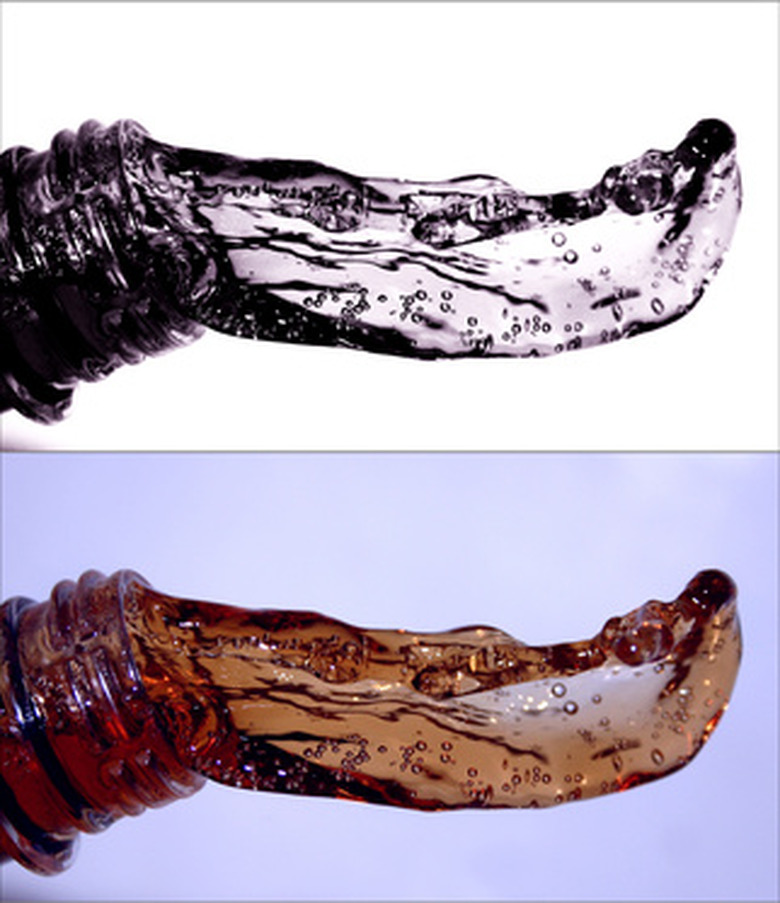How To Convert Pounds To Liters With Specific Gravity
Specific gravity is a quantity that compares the density of a substance to that of water. More precisely, specific gravity is the density of the substance divided by the density of water. It's a dimensionless ratio that you can use to find the volume of a solid or liquid if you know its weight.
For example, suppose you weigh a sample of paint, and you want to know the volume. You can look up the specific gravity of paint online, multiply it by the density of water, and that will give you the density of the paint. This is particularly easy to do in the CGS system of measurement (centimeters, grams, seconds) because the density of water is 1 g/cm3. In those units, the specific gravity of paint – or any other substance – is the same number as its density. In other units, the numbers are different.
Once you know the density of the paint, the rest is easy. Density (∂) is defined as mass (m) divided by volume (V): ∂ = m/V. You know the mass from having weighed the sample, and you know the density, so you can calculate the volume. Things get complicated if you weigh in pounds and want the volume in liters. Going from pounds to liters involves two different measurement systems and some messy conversions.
Specific Gravity Does Not Depend on Measurement System
Specific Gravity Does Not Depend on Measurement System
The definition of specific gravity is the density of a substance divided by the density of water. There are no specific gravity units, because the units cancel when doing the division. In other words, specific gravity is a dimensionless ratio, and it stays the same no matter which units you use to measure density.
To verify this, consider gasoline. In the MKS system (meters, kilograms, seconds), its minimum density is around 720 kg/m3, and in those units, the density of water is approximately 1,000 kg/m3. That makes the specific gravity of gasoline 0.72. In imperial units, the minimum density of gasoline is 45 lb/ft3, and the density of water is 62.4 lb/ft3. Dividing these numbers produces the same ratio: 0.72.
Using the Specific Gravity of Paint to Find Its Volume
Using the Specific Gravity of Paint to Find Its Volume
Paint products differ, but on average, the specific gravity of paint is about 1.2. Suppose you weigh a sample of leftover paint you have in a bucket and find it weighs 20 pounds. How do you calculate its volume in liters?
1. Convert Mass to Kilograms
Weight is not the same as mass, and the imperial system has different units for these quantities. Weight is measured in pounds, which is a unit of force, and mass is measured in slugs. To find the mass of the paint in slugs, you have to divide the weight by the acceleration due to gravity, which is 32.2 ft/s2. Consequently, 20 lbs = 0.62 slugs, which is the mass of the paint you have on hand (to two decimal places). Now convert this to kilograms, using the conversion 1 slug = 14.59 kg. You have 9.06 kg of paint.
Alternatively, you could simply use the conversion 1 lb = 0.45 kg, but that's too easy, right?
2. Find the Density of the Paint
If the density of the paint is ∂p, the density of water is ∂w and the specific gravity of paint is SGp, then:
SGp = ∂p/∂w.
The specific gravity of paint is 1.2, and the density of water is 1,000 kg/m3. Rearrange the equation to solve for ∂p –> ∂p = SGp × ∂w and plug in the numbers to get the density of paint:
∂p = 1,200 kg/m3.
3. Find the Volume and Convert to Liters
Density is mass/volume (∂ = m/V). You know the density of the paint and you know its mass, so you can find the volume after rearranging the equation:
V = m/∂ = (9.06 kg) ÷ (1,200 kg/m3) = 0.00755 m3.
One cubic meter = 1,000 liters, so the volume of paint you have in the container is 7.55 liters.
Cite This Article
MLA
Deziel, Chris. "How To Convert Pounds To Liters With Specific Gravity" sciencing.com, https://www.sciencing.com/how-6188279-convert-pounds-liters-specific-gravity/. 23 October 2018.
APA
Deziel, Chris. (2018, October 23). How To Convert Pounds To Liters With Specific Gravity. sciencing.com. Retrieved from https://www.sciencing.com/how-6188279-convert-pounds-liters-specific-gravity/
Chicago
Deziel, Chris. How To Convert Pounds To Liters With Specific Gravity last modified March 24, 2022. https://www.sciencing.com/how-6188279-convert-pounds-liters-specific-gravity/
